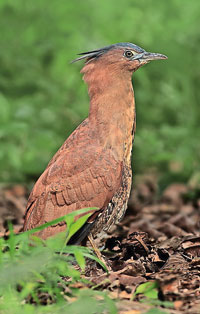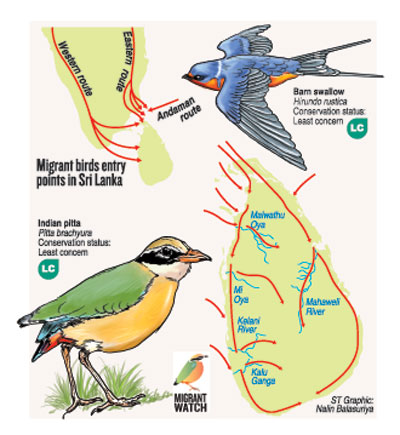News
They have flown a long way – be kind
View(s):By Malaka Rodrigo
As the bird migration season begins, experts are urging the public to watch out for exhausted migrants found in their gardens and neighbourhood in coming weeks.A number of exhausted or dead birds were found this week. A disorientated dead Indian pitta, commonly known as avichchiya, was found dead after having flown into a window at Pelawatte, birdwatcher Will Duncan reported on October 18. Another dead pitta was by seen Harshani Ratnayake the same day.
After flying hundreds of miles, weakened birds can easily become disorientated and lose their way. Records indicate Colombo can expect more Indian pittas this month so people are asked to be vigilant.

Malayanan Night Heron Pic by Vimukthi Weeratunga
If an exhausted migrant is found, the bird should first be protected from predators such as dogs, cats, rats and crows. If the bird is able to fly and show recovery on its own, let it recover naturally under a watchful eye, the Field Ornithology Group of Sri Lanka (FOGSL) advises. Its MigrantWATCH program is aimed at assisting such troubled migrants.
 If the bird is unconscious or takes a long time to recover keep it in a dark, quiet and warm place; a clean cardboard box with small holes for ventilation would be a good enclosure for the troubled bird. Handle the bird as little as possible to avoid adding to its stress.When the bird is able to fly, release it as soon as possible in a safe environment. Attend to traumatic injuries (broken bones) as necessary and if extensive care is needed, consult a veterinarian.
If the bird is unconscious or takes a long time to recover keep it in a dark, quiet and warm place; a clean cardboard box with small holes for ventilation would be a good enclosure for the troubled bird. Handle the bird as little as possible to avoid adding to its stress.When the bird is able to fly, release it as soon as possible in a safe environment. Attend to traumatic injuries (broken bones) as necessary and if extensive care is needed, consult a veterinarian.
Launching MigrantWATCH 2016-17, biologist Vimukthi Weeratunga called for the protection of bird habitat. “Decades ago, we could see thousands of migrant birds in wetlands such as Bundala but such large flocks are rare today in southern Sri Lanka,” he said, using the example of the “star” migrant, the greater flamingo, that has abandoned the Bundala wetlands.
“Even small home gardens in Colombo could be vital for the survival of some of the migrant species so the public can do its part and make home gardens bird-friendly,” Mr. Weeratunga said.The blue-tailed bee-eater, forest wagtail, barn swallow, brown flycatcher and brown shrike are some of the common migrants to be seen even in Colombo.
Mr. Weeratunga, a veteran photographer, has photographed rare migrant birds and asked birdwatchers to be watchful because common-looking birds could turn out to be a rare migrant that might be paying their first recorded visit to Sri Lanka.The long-distance migrants can be badly affected by the impact of climate change. Last year, the University of Copenhagen conducted a study based on observations of thousands of volunteer birdwatchers across Europe and found that birds are affected by changing climatic conditions and that while some species benefit from these changes, birds of colder regions stand to suffer.
Sri Lanka lacks sufficient data to analyse the adverse effects of climate change and other environmental issues on birds so the Field Ornithology Group of Sri Lanka (FOGSL), based at the University of Colombo, is calling on bird lovers to record sightings of migrants and submit them to the MigrantWATCH program.
As part of the program, the FOGSL has scheduled a two-hour public lecture by Professor.Sarath Kotagama on New Updates on Bird Migration on Saturday, October 29 at 9.30am at the Department of Zoology of the University of Colombo. A field visit to observe migrants in Colombo’s wetlands has been arranged for Sunday, October 30 starting from Thalawathugoda Wetland Park, from 6.30-9am.
These events are free and all are welcome, and the FOGSL is keen to meet those who are new to birdwatching. For more information about these events and how to be part of this Citizen Science program, call organisers on 0712289022 or email migrantwatch.srilanka@gmail.com.
Malaka Rodrigo is a coordinator of the MigrantWATCH programme.

